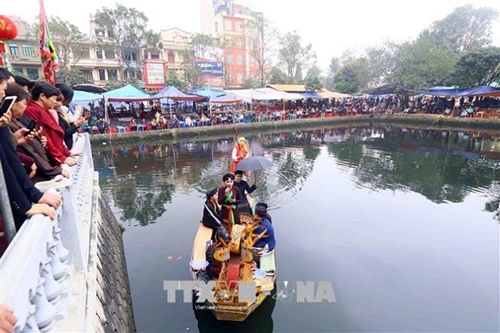The annual festival, including incense-offering and water procession ceremonies, folk games, music and sport exchanges, aims to commemorate Tan Vien Son Thanh – one of the four immortals in traditional Vietnamese mythology.
Ba Vi district is home to more than 100 relic sites worshipping Tan Vien Son Thanh, including the three temples of Thuong, Trung, Ha –sacred destinations that attract tens of thousands of tourists per year.
A tourism promotion programme themed “Ba Vi green tourism - cultural destination” was launched on the occasion.
Boasting a great potential for tourism development, Ba Vi is focusing on develop different tourism types, such as cultural and community-based tourism, ecotourism, and resort tourism.
Previously, on February 16, crowds of local and visitors have flocked to Tien Du district in the northern province of Bac Ninh to attend the Lim festival that opened on February 16.
    |
 |
|
At the Lim Festival in Bac Ninh province |
The two-day annual event took place on February 16-17, which fell on the 12th and 13th days of the Lunar New Year. It is dedicated to Quan ho (love duet singing) recognised as the world’s by UNESCO.
Incense offering rituals and a water procession are staged during the festival.
Representatives from the organising board said the festivals is part of highlight events to mark the 10 years since Quan ho has been inscribed on the Representative List of the Intangible Cultural Heritage of Humanity.
Love duet singing is an art form combining various elements, including music, lyrics, costume and a unique style of singing the reflects the close relationship between singers. Performances of love duet songs are made by “lien anh” (brothers) and “lien chi” (sisters), who are ordinary people hailing from different villages.
The rich and diverse tunes and fine lyrics of the songs portray the zest for life and distinctive cultural features of people in the region formerly called Kinh Bac.
Bac Ninh has made considerable efforts to realise its commitments to UNESCO to conserve and uphold the value of this art form, thus obtaining comprehensive results.
The songs are alternating response verses between male and female singers. Quan ho singing is common at rituals, festivals, competitions, and informal gatherings, where guests will perform a variety of verses for their hosts before singing farewell.
Source: VNA